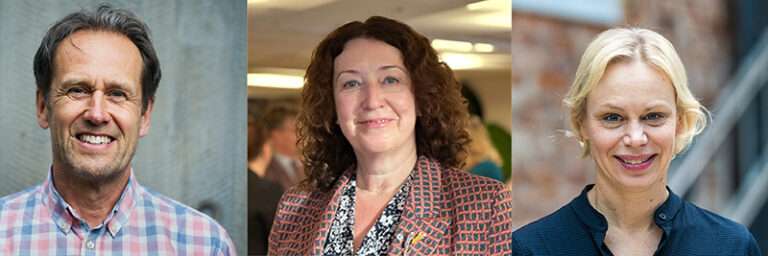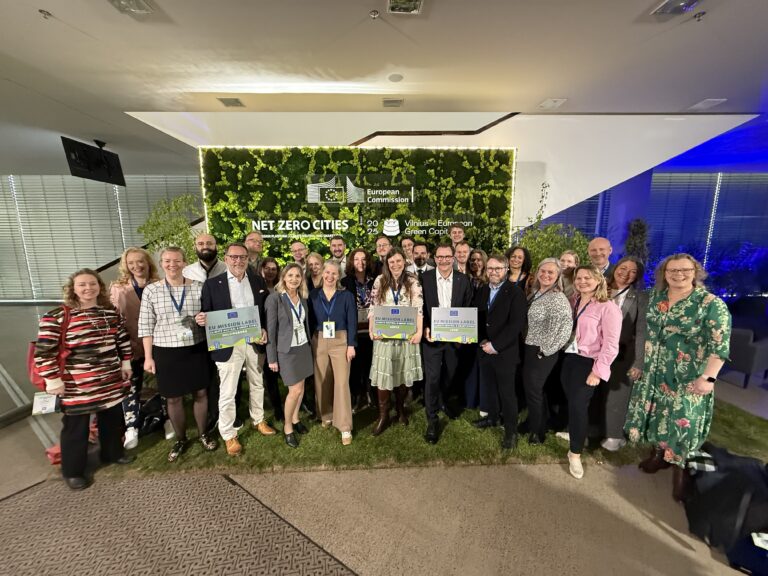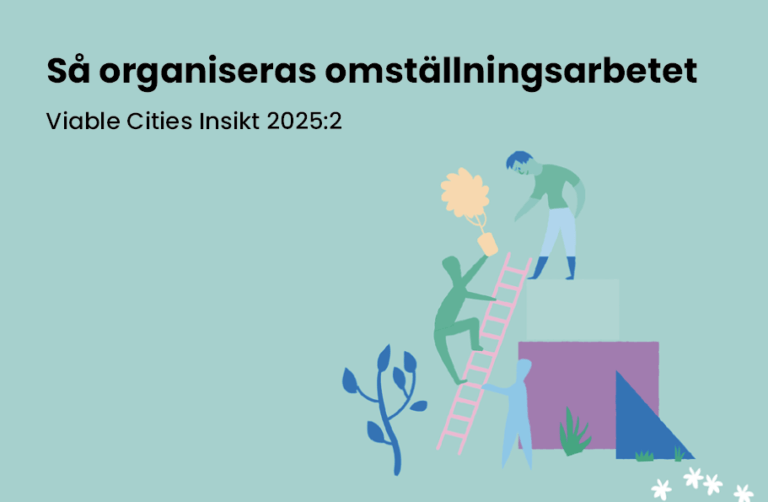The climate challenge is a critical issue where cities have a key role to play. From Lund in the south to Umeå in the north, nine cities are now being granted funding for projects that can accelerate climate change. The funding is part of the strategic innovation program Viable Cities, which is coordinated by KTH, and the support includes a total of SEK 35 million that is matched with the same amount from the cities, giving a total budget of SEK 70 million.
- "With this initiative, we want to work with the cities and their partners to develop innovation initiatives that provide rapid and powerful effects to achieve climate-neutral cities in 2030. But it is also absolutely necessary that the initiatives provide a good life for everyone in the city," says Viable Cities program manager Olga Kordas, who is also a researcher at KTH.
Enköping, Gothenburg, Järfälla, Lund, Malmö, Stockholm, Umeå, Uppsala and Växjö are the cities that are now receiving funding and taking on the task of becoming climate neutral by 2030.
- "The cities that have been granted support must develop action plans with a holistic approach to climate change and build cross-sectoral innovation teams with the mandate and ability to accelerate the transition to a climate-neutral city by 2030," says Susanne Karlsson, Head of Unit at the Swedish Energy Agency.
Among the elements of the ambitious climate action plans are exciting examples of how cities will work to take advantage of opportunities in digitalization and citizen engagement. For example, Gothenburg will use climate and behavioral data in a digital twin of the physical environment as a catalyst in the transition work. Another example is Umeå, where further work will be done on citizen engagement for climate transition based on the city as a test bed for sharing services in the Sharing Cities Sweden program.
The projects will start in September 2019 and run for two years. They are each co-financed with between three and five million SEK. The initiative is inspired by the ongoing work in the EU with so-called "mission-driven innovation". One basic idea is to focus research and innovation on a visionary but concrete goal - Climate Neutral Cities 2030 - that can bring together many forces and lead to groundbreaking systemic changes.
- In addition to individual city projects, efforts will be made to enable cities to work together and benefit from lessons and insights to accelerate climate change. "Our common ambition is to inspire the cities of the world," says Olga Kordas.
Here are the approved projects:
Enköping: In the project in Enköping, an IoT platform will make it possible to collect/share new data from buildings and the environment, thereby creating improved decision-making, scalable innovations and new services. To test dialogue effects and anchoring patterns with citizens, grouped qualitative digital pilots are conducted.
Contact: Thomas Adlercreutz, Enköping Municipality
Gothenburg: The project focuses on a data-driven climate transition for the good life in Gothenburg. An important part of this is new system solutions linked to mobility that can reduce climate impact and provide conditions for adaptive management of the city. An important ambition is to add more climate and behavioral data to the model called "Virtual Gothenburg", i.e. the city's digital twin of the physical environment. The aim is also to use the digital twin as a catalyst in the transition work.
Contact: Henriette Söderberg, City of Gothenburg
Malmö: In this project, the City of Malmö will bring together internal and external stakeholders in an innovation team to jointly create a goal that enables climate neutrality in Malmö by 2030. The innovation team will also develop an agile action plan for achieving the goals. In some cases, the stakeholders have control over the required actions. The project has a particular focus on citizen engagement. The project will also examine what digital tools already exist, and what needs to be developed, to accelerate the transition to a climate-neutral city in 2030.
Contact: Matilde Törnqvist, City of Malmö
Lund: To develop a smart and climate neutral Lund 2030, an innovation team will be formed consisting of design companies, research institutions and a cross-sectoral team centrally located in the municipality. This team, together with an innovation mapper, will deliver a roadmap for how Lund can become climate neutral by 2030.The team will deliver at least five concepts with great potential to contribute to climate neutrality by 2030, based on citizens' needs and with digitalization as an enabler.
Contact: Tommy Bengtsson
Järfälla: The Barkarbystaden district in Järfälla is developing a brand new neighborhood with thousands of planned homes and workplaces. The project aims to make Barkarbystaden a model for climate-neutral cities, starting with Järfälla's carbon budget and focusing on the areas of mobility and construction. A number of pilot projects will provide increased knowledge and an action plan for Barkarbystaden's continued development towards climate neutrality. The result is expected to fill several knowledge gaps in climate-neutral urban planning and is useful for urban development projects throughout Sweden.
Contact: Megha Huber, Järfälla Municipality
Stockholm: The project in Stockholm aims to improve the ability of cities to deal with the complex decision-making situations that arise and find appropriate measures to reduce emissions. An innovation team with the municipality, academia and business is established as the engine of the transition work. A digital decision support tool with simulation and visualization of the city's energy and transport system enables an overview of the consequences of measures and additional needs. The tool is based on existing data from a variety of actors in Stockholm, but is generally applicable, and includes scenario analyses of the consequences of various measures.
Contact: Björn Hugosson, City of Stockholm
Uppsala: Uppsala Municipality and the Uppsala Climate Protocol network will develop an action plan for a fossil-free welfare society in 2030. The project will 1) implement new IT tools for visualization in order to increase awareness and stimulate broad participation in the work of developing and then implementing the climate roadmap, 2) develop interdisciplinary and cross-sectoral innovation teams with academia, business and society to make Uppsala and Bergsbrunna an international model as a test bed for sustainable urban development.
Contact: Björn Sigurdsson, Uppsala Municipality
Umeå: The project for a smart climate-neutral Umeå 2030 is based on a consumption perspective on the city's climate impact and includes emissions within and outside Umeå's geographical boundaries. Efforts are focused on four hotspots to reduce households' climate impact: 1. Travel (flying and car use), 2. Food (meat consumption, dairy products and food waste), 3. Residential energy 4. Clothing and furniture. The work also involves the development of two completely new neighborhoods, Tomtebostrand and Norra Ön, which both have the ambition to be international sustainability role models.
Contact: Sebastian Holmström, Umeå Municipality
Växjö: In this project, Växjö municipality wants to collaborate with actors in society to develop an action plan and methods for the transition to a society with low climate impact. The project will work with the overall picture for a climate-neutral Växjö, but will also focus on the areas of construction and transportation. Within the project, digital tools will be created and tested with a focus on improving insight into existing emissions and allowing planning and comparison of different solutions and scenarios needed to achieve climate neutrality in 2030. The project will also work with a "think tank" that will serve as a local climate council that follows, supports and drives the local climate work.
Contact: Henrik Johansson, Växjö municipality
For more information, please contact
Program Manager Olga Kordas 070-213 23 26 olga.kordas@viablecities.se
Head of Unit Susanne Karlsson 016-544 23 75 susanne.karlsson@energimyndigheten.se
Communication Strategist Åsa Minoz 072 - 210 88 26 asa.minoz@viablecities.se



